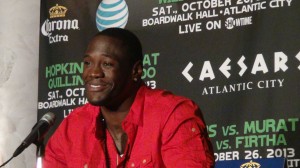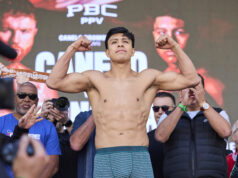By Bart Barry-

Saturday in Las Vegas, undefeated American heavyweight Deontay Wilder saw his 32-fight knockout streak come to a quiet end against Bermane Stiverne. Expected to force a violent conclusion to the match, regardless of victor, Wilder instead cautiously and exhaustedly made his way to the closing bell and won a wide decision, 120-107, 119-108 and 118-109. Stiverne, who wore a title of some sort during his ringwalk, fought like a man trained and conditioned for an entirely different affair than which one his contract mandated.
And American boxing fans, in all our learned helplessness, dutifully expressed pride, surprise and admiration for our new partial titlist in the heavyweight division, saying things like: “I was really impressed with Wilder’s intelligence, prudence and temperament.”
It’s incredible to’ve been reduced to this. There was genuine interest in Wilder’s match with Stiverne, despite a half-full and probably papered MGM Grand Garden Arena, and none of that interest, not an iota of it, reduced to someone’s hankering for a show of intelligence, prudence or temperament. Not a jot. Much as boxing fans were instructed to do in November immediately after a man named “Krusher” imperiled not once a quinquagenarian in 36 minutes of trying, though, Saturday’s match, a frankly dull 12-rounder, caused us to cast about for expressions of marvel at a fight, expected to be violent and shortlived, that heard its final bell.
That result is not incredible or amazing for having such a minority of prognosticators predict it; that result is disappointing in a fundamental way. The reason no one predicted a decision victory was because American fans wanted so badly for someone new to emerge in the heavyweight division, someone American, and Wilder would be that man, decapitating the crafty Stiverne sometime between early in the fight and its opening bell. Instead, American fans’ ardor gets obtunded, once more, to protesting we didn’t expect what we got, though, really, it’s for the better, I mean what did we know, actually, in an odd sort of way, the disciplined, cerebral decision victory was truly much much better for everyone involved than the violent knockout we begged for.
Does any other sport demand from its spectators so much narrative-lugging, forgetfulness and self-loathing?
There is a large difference, though, between being disappointed in Saturday’s fight and being disappointed in Deontay Wilder. I sat ringside in Tucson for Wilder’s sixth and seventh professional matches, first round knockouts of men with a cumulative record of 4-6-2, and had anyone told me – and possibly someone did – Wilder would someday be a titlist in the heavyweight division, I would have scoffed at the suggestion, made a corruption quip, or predicted his matchmaker, whoever that might be, would go in Canastota on a first ballot. Wilder had size, a right hand, and athleticism, but otherwise he was like every other American heavyweight who tries boxing after washing-out of two or three other sports. Wilder was an athlete, ever and again, not a fighter.
That assertion stands, however much Wilder continues to exceed initial expectations. One other thing: Wilder is a charismatic guy you’re right to cheer for.
Before Wilder’s seventh prizefight, a round 1 shellacking of a lad named Travis Allen, colleague and friend Norm Frauenheim agreed to a friendly over/under bet placed at 90 seconds. While I no longer recall which way Norm went, I do recall this: When the official time got read, “one minute and thirty seconds of the first round,” we needed a tiebreaker. It seemed only just to ask Wilder’s opinion. When he visited press row, we sought his counsel, since his knockout came right on our number. Wilder looked down, pondered the question, looked up, shined his infectious smile, and said, “I would have bet the under.”
That a man with such limited boxing experience and skill has parlayed his size and athleticism to a title of some kind, in a way none of thousands of other similar such American heavyweights has managed, is wonderful for Wilder. His personal achievement should be applauded, and Wilder himself should be supported. To pretend Saturday was a victory for our struggling sport, though, is an absurdity.
Let us set our pompoms down once more, too, and reflect on how unseemly the final two minutes of Saturday’s match were when set against the first 30 seconds of postfight celebration. Wilder leaned and clinched and clung and absorbed Stiverne’s ineffective aggressiveness for most of the final 120 seconds of Saturday’s match, doing a successful imitation of a man riding a nag named Exhaustion in circles round Death’s abode. Then the final bell rang, manager Al Haymon’s flunky reported his dancing shoes to the blue mat, and Wilder came alive. As Muhammad Ali rope-a-doped George Foreman in 1974, Deontay Wilder rope-a-doped Showtime viewers in 2015. His fatigue was a ruse! He wasn’t really too weariful to stop Stiverne; he was conserving energy for a ferocious postfight microphone session. In an extraordinary display of incongruence, Wilder, who’d appeared not to take a single Stiverne punch personally in seven minutes, unleashed a wrathful display on Showtime’s innocent and defenseless cameras, whacking his own chest and roaring about his boxing ability, before turning his suddenly ungovernable rage towards press row, where he repeatedly shouted haterswards: “Who can’t box?”
One snickers to think what Wladimir Klitschko – who, on a bad night, wouldn’t need 10 rounds to ice both Stiverne and Wilder – thought of America’s savage new champion of the heavyweight division.
Bart Barry can be reached via Twitter @bartbarry







